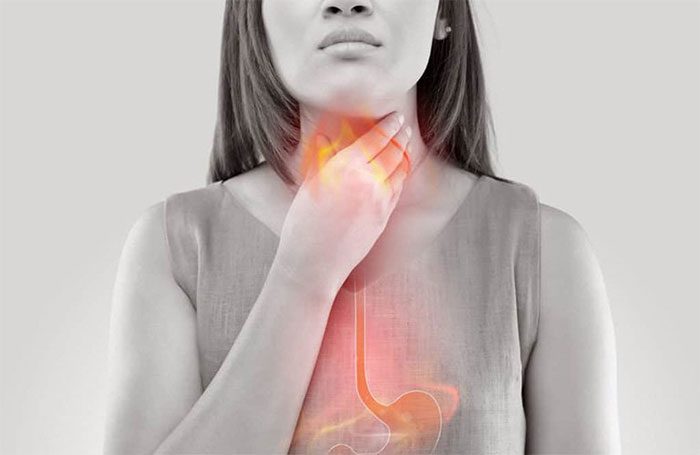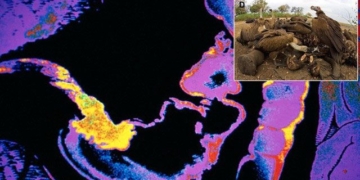Do you sometimes feel a choking sensation in your throat and experience burping, but you don’t know the cause? Let’s explore the 17 most common causes of this condition.
Choking Sensation in the Throat: Key Information
- What Causes Choking Sensation and Burping?
- 1. Helicobacter Pylori Infection
- 2. Gastroesophageal Reflux Disease
- 3. Esophageal Spasms
- 4. Asthma
- 5. Thyroid Hormone Imbalance
- 6. Chronic Pharyngitis
- 7. Esophagitis
- 8. Gastritis
- 9. Peptic Ulcer Disease
- 10. Esophageal Diverticula
- 11. Digestive Disorders
- 12. Stomach Cancer
- 13. Infections
- 14. Allergies
- 15. Goiter
- 16. Foreign Body Aspiration
- 17. Anxiety Disorders
- Home Remedies for Choking Sensation and Burping
- When to See a Doctor?
What Causes Choking Sensation and Burping?
1. Helicobacter Pylori Infection
Helicobacter pylori infection is common among many individuals, as this bacterium is prevalent in the stomach. However, an excessive presence of H. pylori can disrupt the balance of gut flora, affecting digestion and food breakdown, which complicates the stomach’s function.
When food is not digested properly or is digested slowly due to H. pylori infection, gas is produced, leading to bloating and reflux into the esophagus and mouth, resulting in a choking sensation in the throat and burping.
2. Gastroesophageal Reflux Disease (GERD)
Gastroesophageal reflux disease, often referred to as acid reflux, is the condition of stomach acid flowing back into the esophagus. GERD can be physiological (not affecting daily life and physical development) or pathological, potentially leading to malnutrition, esophagitis, and other respiratory complications, even death.
3. Esophageal Spasms
Esophageal spasms are a disorder of the smooth muscle contractions in the esophagus – the tube connecting the mouth and stomach – causing difficulty in moving food down into the stomach. When you experience esophageal spasms, the muscle between your esophagus and stomach (the lower esophageal sphincter) fails to function correctly, preventing food from passing down. This results in a choking sensation in the throat and burping.

Esophageal spasms can cause discomfort in the throat.
4. Asthma
Asthma, also known as bronchial asthma, is a respiratory condition characterized by chronic inflammation of the airways. When exposed to irritants, the bronchial tubes of asthma patients, which are already highly sensitive, react intensely, exhibiting symptoms such as shortness of breath, wheezing, chest tightness, a feeling of fullness in the throat, and coughing. The severity of asthma attacks varies depending on the irritants and the individual patient’s predisposition.
5. Thyroid Hormone Imbalance
Thyroid disorders affect the thyroid gland, a butterfly-shaped gland in the neck. The thyroid plays a crucial role in regulating many metabolic processes in the body. Various types of thyroid disorders affect both the structure and function of the gland.
The function of the thyroid is regulated by a feedback mechanism involving the brain. When thyroid hormone levels drop, the hypothalamus produces thyroid-stimulating hormone (TSH) to stimulate the pituitary gland (located at the base of the brain) to release thyroid-stimulating hormone.
Since the thyroid is controlled by the pituitary gland and hypothalamus, disorders in these tissues can also impact thyroid function and result in thyroid-related issues.
6. Chronic Pharyngitis
Chronic pharyngitis is a long-lasting inflammatory condition of the throat, typically persisting for over a week. This occurs as a result of repeated acute pharyngitis that is unresponsive to treatment. Common signs of chronic pharyngitis include sore throat, worsened by swallowing, persistent coughing, and sometimes phlegm. A prolonged sore throat and cough lasting several weeks are alarming symptoms that require immediate medical evaluation to rule out or identify other serious underlying conditions.
7. Esophagitis
Esophagitis is the inflammation of the mucous membrane lining the esophagus, the digestive tract connecting the throat to the stomach. If left untreated, this condition can cause swallowing difficulties due to ulcers and scarring in the esophagus, leading to symptoms such as painful swallowing, a choking sensation, and chest pain. In some cases, esophagitis may progress to Barrett’s esophagus, a risk factor for esophageal cancer.
8. Gastritis
Gastritis occurs when the stomach lining becomes inflamed or swollen. Gastritis can be acute (occurring suddenly) or chronic (lasting for extended periods). It is generally not dangerous and can improve quickly with treatment. However, in some cases, gastritis can lead to stomach ulcers and increase the risk of cancer.
9. Peptic Ulcer Disease
Peptic ulcer disease causes inflammatory damage and ulceration of the stomach or duodenal lining (the initial part of the small intestine). These lesions occur when the inner lining of the stomach or duodenum is eroded, exposing the underlying layers. Duodenal ulcers account for 95% of cases, while gastric ulcers account for 60%, with ulcers on the lesser curvature of the stomach constituting 25% of cases.
10. Esophageal Diverticula
The esophagus is the digestive tube connecting the throat to the stomach and typically consists of three sections: cervical, thoracic, and abdominal.
Esophageal diverticula are a common condition characterized by pouch-like bulges that protrude at weak points in the esophagus. These diverticula can occur at any location within the esophageal lining between the throat and stomach. The most common symptoms of esophageal diverticula are choking sensations and burping.
11. Digestive Disorders
Any disruptions that occur during the digestion of food are classified as digestive disorders. Many disorders simultaneously affect several parts of the digestive system, while others may only impact one organ or area.
Common symptoms seen in individuals with digestive disorders include abdominal pain and bowel irregularities. If the pain is mild and transient, it may indicate minor issues that are not bothersome.
However, if you experience bloating accompanied by a loss of appetite, distension, indigestion, weight loss, or blood in the stool, you should seek immediate medical attention for examination, including rectal and colonoscopy to assess your condition.
12. Stomach Cancer
Early-stage stomach cancer (or initial stage) occurs when cancer cells are still located in the submucosa. Typically, tumors at this stage are very small, ranging from a few millimeters to 7 cm, and do not significantly impact stomach digestion. Therefore, early detection of stomach cancer requires participation in screening programs.
13. Infections
Infections such as tonsillitis and streptococcal pharyngitis can cause a choking sensation in the throat or sore throat. This may occur due to inflammation in the respiratory tract as your body fights off the infection.
14. Allergies
An allergic reaction occurs when your immune system mistakenly identifies something harmless as a dangerous substance and initiates a defensive response. The most severe type of allergic reaction is known as anaphylaxis.

There are many causes of choking sensations in the throat. (Image: Internet).
The chemicals released during anaphylaxis cause inflammation, leading to swelling and constriction of your throat and airways. The most common triggers of anaphylaxis include:
- Food allergies
- Insect stings
- Adverse reactions to medications
Other symptoms of anaphylaxis include:
- Feeling of tightness or pain in the chest
- Shortness of breath
- Wheezing
- Coughing
- Swelling of the skin, lips, or tongue
- Rash or hives.
This condition requires immediate emergency assistance as soon as the signs and symptoms appear.
15. Goiter
A goiter is a benign (non-cancerous) enlargement of the thyroid gland. If the thyroid becomes too large, it can compress the trachea and/or esophagus, leading to respiratory and swallowing difficulties, as well as a sensation of choking in the throat.
16. Foreign Object Aspiration
A foreign object aspiration can cause a feeling of choking in the throat. If you feel a choking sensation due to a foreign object, the most important thing is to try to stay calm. If the object is not large and does not cause breathing difficulties, you can try coughing forcefully or drinking some water to see if you can push it down.
However, if you have difficulty breathing, cannot speak, or the object has caused injury or is stuck, you need to seek medical help immediately. This could be an emergency situation that requires handling by medical professionals. If you are alone, you might try the Heimlich maneuver on yourself—a method to attempt to dislodge the foreign object from the airway by applying strong pressure to the upper abdomen.
17. Anxiety Disorders
Anxiety can manifest with physical symptoms, including a choking sensation in the throat. Shortness of breath and the feeling that the throat is tightening are typical signs of a panic attack.
Other symptoms of a panic attack include:
- Chest pain
- Cold sensations
- Dizziness
- Feeling out of control
- Headache
- Confusion, feeling lightheaded
- Nausea
- Rapid heartbeat
- Feelings of fear or despair
- Excessive sweating
- Numbness or loss of sensation in the hands
- Weakness.
In addition to the choking sensation in the throat, a person may also feel as if they have a lump or a marble in their throat. Health professionals refer to this sensation as globus pharyngeus or globus hystericus (loosely translated as a feeling of fullness in the throat).
Some individuals may experience esophageal symptoms due to their bodies being overly sensitive to discomfort or pain. Anxiety and stress can also play a role in triggering this sensation.
Home Remedies for Choking Sensation and Bloating
Consume more stomach-friendly foods and limit those that irritate the stomach or are hard to digest, such as:
- Yogurt: Eating yogurt helps increase beneficial bacteria and speeds up the digestion process, preventing excess food from producing gas that causes bloating.
- Bread: This food has high absorbent properties, which helps reduce acidity in the stomach. Therefore, those experiencing bloating should incorporate bread into their daily diet.
- Oatmeal: Contains a large amount of natural fiber beneficial for digestion. Eating oatmeal in the morning helps reduce excess stomach acid that can build up after a long sleep.
- Ginger: Has antibacterial properties and treats digestive issues. Consuming ginger also helps alleviate discomfort from gastroesophageal reflux disease (GERD) such as stomach pain, nausea, and indigestion…
- Cantaloupe, Watermelon: These fruits help cool the body, provide abundant vitamins, and improve bloating for those suffering from gastroesophageal reflux disease.
- Herbal Tea: Herbal teas like clove tea and chamomile tea are soothing for the stomach, calming for the nerves, and effective in alleviating stress, thus improving digestive disorders that cause bloating.
Eat regular meals at the right times, chew thoroughly, and avoid vigorous activity after eating. Don’t overeat or indulge excessively.
Engage in regular exercise to boost immunity and enhance stomach health.
Drink plenty of water to promote digestion and reduce stomach acid levels.
When to See a Doctor?
Pay attention to consulting a doctor if the choking sensation in the throat and bloating occur alongside:
- Symptoms that appear too frequently and do not resolve after a few days.
- You have a history of digestive system disorders.
- Multiple accompanying symptoms: vomiting, chest and epigastric pain, shortness of breath, fatigue, digestive disorders…
10 Causes of a Choking Sensation in the Throat
Thousands of People Who Choke Will Be Saved Each Year Thanks to This Invention


















































